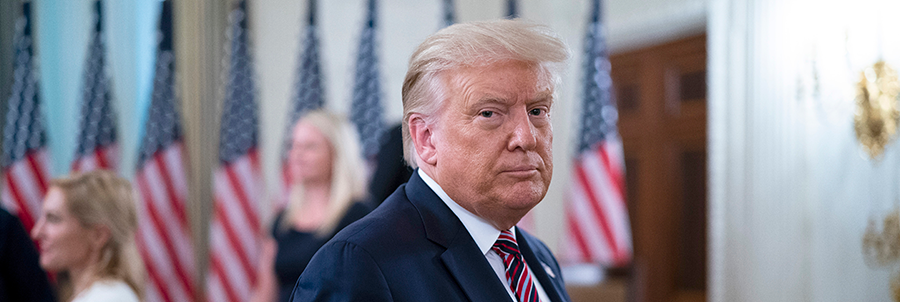Former President Donald Trump is facing possible criminal charges in New York for allegedly paying adult film star Stormy Daniels money in 2016 for her silence about a sexual encounter.
Seven in 10 Americans (69%) say that a political candidate paying money for someone’s silence about an issue that may affect an election's outcome is a crime, according to the latest Economist/YouGov poll. Those numbers are essentially unchanged from last week's poll, when 72% agreed. While Americans' opinion overall has remained steady, there has been a significant shift in Republicans' views.
According to this week's poll, 60% of Republicans say that exchanging money for silence on an issue that could affect the election is a crime. In last week's, 73% of Republicans said the same. While that's still a majority belief in the latest poll, it reflects an increase in the share of Republicans who say it's not a crime (to 21% in this week's poll from 13% in last week's) and who are unsure (to 19% from 14%). It nonetheless remains far higher than the 37% who said it is a crime in August 2018.
There was a similar drop in share of Republicans who believe it is a crime for a candidate to fail to report spending campaign money on payments to keep someone silent about an issue that may affect the outcome of an election. According to this week's poll, 62% of Republicans say this constitutes a crime, down from 76% in last week's. Three-quarters of Americans (74%) — the same share as the week before — agree.
The investigation and grand jury deliberations in New York City that may result in Trump being charged with a crime evoke far more partisan reactions than do the underlying issues involved. By 46% to 34%, Americans say Trump should face criminal charges over paying adult-film star Stormy Daniels money for her silence about a sexual encounter in 2006. Democrats (77% to 11%) and Independents (44% to 30%) are more likely than not to say Trump should face criminal charges — but only 14% of Republicans agree. Nearly two-thirds (63%) of Republicans say he should not face charges.
— Carl Bialik and Taylor Orth contributed to this article
See the toplines and crosstabs from the Economist/YouGov poll conducted on March 19 - 21, 2023 among 1,500 U.S. adult citizens.
Methodology: Respondents were selected from YouGov’s opt-in panel using sample matching. A random sample (stratified by gender, age, race, education, geographic region, and voter registration) was selected from the 2019 American Community Survey. The sample was weighted according to gender, age, race, education, 2020 election turnout and presidential vote, baseline party identification, and current voter registration status. Demographic weighting targets come from the 2019 American Community Survey. Baseline party identification is the respondent’s most recent answer given prior to June 1, 2022, and is weighted to the estimated distribution at that time (34% Democratic, 31% Republican). The margin of error for the overall sample is approximately 3%.
Image: Getty Images








